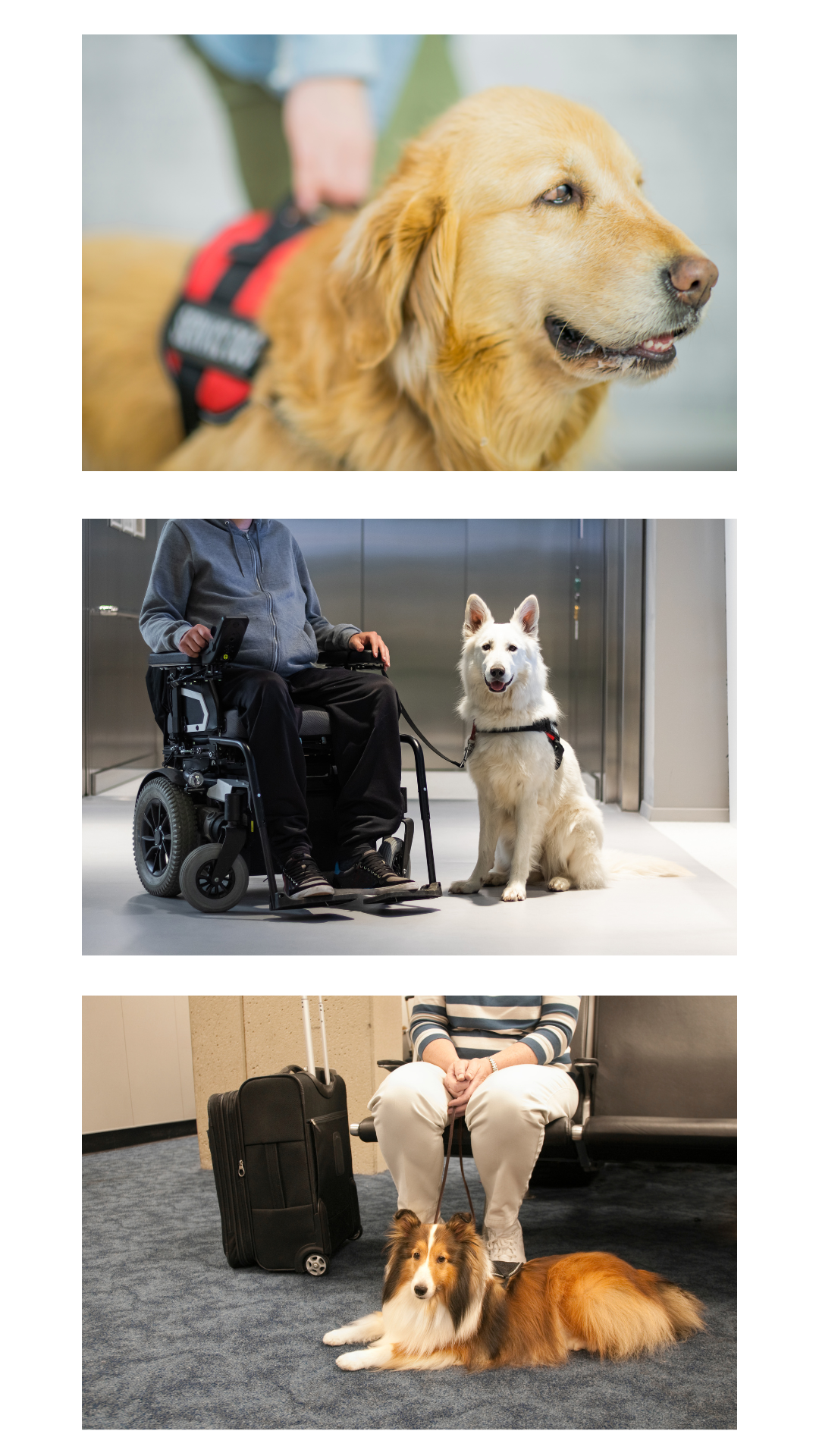Training a service dog
Finding a qualified and reputable service dog trainer is crucial to ensure that your service dog receives proper training and is well-prepared to assist you with your specific needs. Here are some steps to help you find a service dog trainer:

- Research Local Trainers: Start by researching service dog trainers in your local area. Look for trainers who specialize in service dog training or have experience in training assistance dogs for people with disabilities. You can search online, ask for recommendations from your veterinarian, disability organizations, or other service dog owners in your community.
- Check Qualifications and Experience: Verify the qualifications and experience of potential trainers. Look for trainers who have certifications from recognized organizations, such as the International Association of Assistance Dog Partners (IAADP), the Certification Council for Professional Dog Trainers (CCPDT), or experienced training service dogs with an accredited (ADI) Assistance Dogs International organization. Experience with training service dogs for specific disabilities is also an important factor to consider.
- Meet the Trainer: Once you have a list of potential trainers, schedule a meeting with them. Discuss your specific needs and requirements for a service dog. Ask about their training methods, how they assess and match dogs to handlers, and what kind of tasks they typically train service dogs to perform.
- Observe a Training Session: If possible, observe a training session conducted by the trainer. This will give you insight into their training techniques and how they interact with the dogs and handlers. Pay attention to the trainer's approach and how well the dogs respond to their cues.
- Request References: Ask the trainer for references from previous clients who have obtained service dogs through their training program. Contact these references to inquire about their experiences and the success of the training.
- Understand the Training Process: A reputable service dog trainer will have a clear and structured training process. They should be able to outline the duration of the training, the frequency of sessions, and the goals they aim to achieve at each stage of training.
- Cost and Contract: Inquire about the cost of the training program and any additional fees. Make sure you understand what is included in the training package and if there are any ongoing support services after the training is completed. Review and understand the terms of the training contract before committing to the program.
- Positive Reinforcement: Look for trainers who use positive reinforcement-based training methods, which focus on rewarding desired behaviors rather than punishing unwanted ones. Positive reinforcement is effective and helps create a trusting and cooperative bond between the dog and handler.
- Trust Your Instincts: Ultimately, trust your instincts when choosing a service dog trainer. It's essential to have confidence in the trainer's abilities and feel comfortable with their training philosophy and approach.
Remember that finding the right service dog trainer may take time and research, but investing in proper training will lay the foundation for a successful and fulfilling partnership with your service dog.
Types of Service Dogs
-
Guide Dogs:
Guide dogs assist individuals who are blind or visually impaired by navigating obstacles and helping them safely travel from one location to another.
-
Hearing Dogs:
These dogs are trained to assist individuals who are deaf or hard of hearing by alerting them to important sounds such as doorbells, alarms, or someone calling their name.
-
Mobility Assistance Dogs:
These dogs aid individuals with mobility impairments by helping them with tasks such as opening doors, retrieving items, or providing stability and balance support.
-
Medical Alert Dogs:
These dogs are trained to detect changes in a person's body odor or behavior associated with certain medical conditions, such as seizures, diabetes, or allergies. They can then alert their handlers or others to take appropriate action.
-
Psychiatric Service Dogs:
Trained to assist individuals with mental health conditions, psychiatric service dogs can provide support by interrupting destructive behaviors, providing comfort during anxiety or panic attacks, and creating personal space in crowded environments.
-
Autism Assistance Dogs:
Specifically trained to assist individuals with autism spectrum disorders, these dogs can provide calming effects, reduce stress, and offer companionship to help with social interactions.
-
Seizure Response Dogs:
These dogs are trained to respond during or after a seizure. They may provide physical support, retrieve medications, or seek help from others.
-
Allergy Detection Dogs:
Trained to detect specific allergens, these dogs can help individuals with severe allergies by alerting them to potential dangers or even retrieving medication.
-
Diabetic Alert Dogs:
These dogs are trained to detect changes in blood sugar levels and alert individuals with diabetes, allowing them to take necessary actions to manage their condition.
-
PTSD (Post-Traumatic Stress Disorder) Dogs:
Trained to assist individuals with PTSD, these dogs can provide emotional support, interrupt anxiety-inducing behaviors, and create a sense of security.

These are only some of the disabilities which service dogs serve to, but there are more disabilities which might be more specific for each user.
It's important to note that service dogs are protected by laws in many countries, allowing them to accompany their handlers in public places and ensuring equal access. Each service dog is trained based on the specific needs of its handler, and the tasks they perform contribute to enhancing the individual's independence and quality of life.
How does Lean on me Canine Assistance work?
Each user has a different condition and has different needs, remember that finding the right service dog trainer may take time and research, but investing in proper training will lay the foundation for a successful and fulfilling partnership with your service dog.
At Lean on me Canine Assistance we provide you with the information to start the necessary process and complete the necessary training for your requirements.
Contact us:
asistenciacaninalmca@gmail.com
